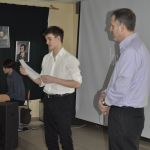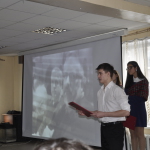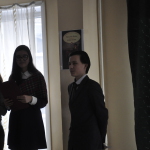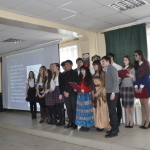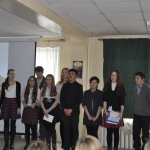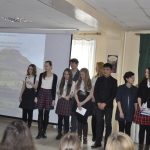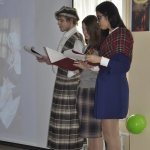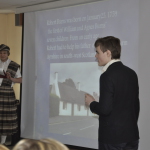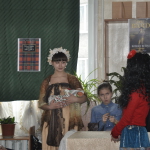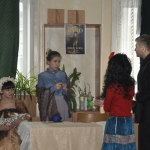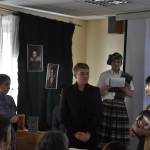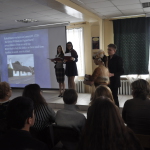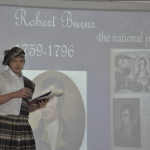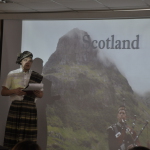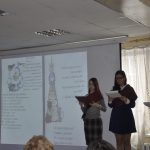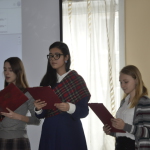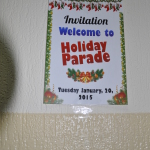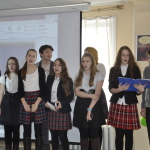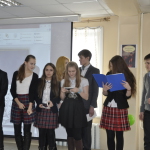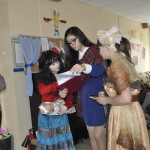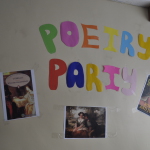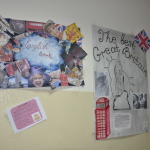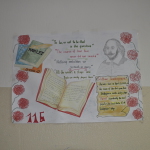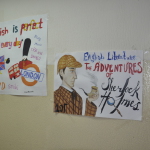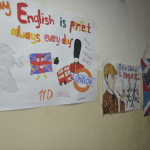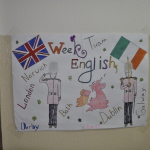Предлагаю вниманию коллег разработку мероприятия «Poetry Party». Мероприятие проводилось 22 января, в рамках недели иностранного языка, а также было приурочено к дню рождения Роберта Бёрнса.
Презентация мероприятия
Литературный вечер для 9-11 классов » В мире английской поэзии»
Цели и задачи:
Учебные задачи: развитие межкультурной компетенции, обогащение словарного запаса английского языка, расширение лингвистических знаний и формируемых с их помощью произносительных навыков, развитие умения восприятия иноязычной речи на слух.
Воспитательная цель: повышение интереса к иноязычной культуре, формирование духовно-нравственной сферы учащихся, изучение национально-культурных особенностей Великобритании,
Образовательная цель: приобщение к иноязычной культуре, расширение культурного кругозора , развитие творческой активности , эстетических вкусов и повышение общей культуры учащихся.
Развивающая цель : развитие интеллектуальной, эмоциональной и мотивационной сферы личности учащихся и расширение их эрудиции, использование перевода произведений на родной язык для лучшего осмысления и осознания особенностей английского язык.
Оборудование: стенгазеты, выставка книг, компьютерные презентации, записи звучания волынки, кельтской музыки, портреты поэтов.
На фоне первого слайда звучит трогательная музыка из кинофильма » Вам и не снилось»
Part I
1ведущий — Good afternoon, dear guests ! Welcome to our English party which is called » In the world of English poetry». The party is devoted to the famous poets of the past.
— What is poetry? Who knows?
Not a rose, but the scent of the rose.
Not the sky, but the light of the sky.
Not the fly, but the gleam of the fly.
Not the sea , but the sound of the sea.
Not myself, but what makes me
See, hear, feel something that prose cannot
And what it is , who knows?
2й ведущий — What is poetry? Poetry is a form of literature art in which language is used to express various emotions. Poetry is a piece of literature written by a poet in verse. Poetry is the language of imagination, feelings and emotions.
1 й — Poetry has always been one of the most favourite kinds of literature in England. Poetry was and still is an important part of British culture and sense of nationhood. English poetry has a lot of different styles: drama and lyrics, sonnets and ballads, limericks and nursery rhymes for children.
2й — What is a nursery rhyme? A nursery rhyme is a poem for young children in Britain and in other countries . The traditional and well known rhymes are considered part of British culture. We suggest to listen to some of the most well-known ones.
| Где ты была сегодня , киска?У королевы у английской.Что ты видала при дворе7Видала мышку на ковре. |
Pussy- cat, pussy -cat,
Where have you been?
I’ve been to London to look at the
Queen.
Pussy-cat, pussy-cat,
What did you do there?
I frightened a little mouse under her chair.
| Robin the BobinRobin the Bobin , the big -bellied Ben,He ate more meat than fourscore men;He ate a cow, he ate a calf,He ate a butcher and a half,He ate a church, he ate a steeple,
He ate a priest and all good people!
A cow and a calf, an ox and a half,
A church and a steeple and all good people.
And yet he complained that his stomach wasn’t full. |
|
Робин-Бобин кое какПодкрепился натощак:Съел телёнка утром рано,двух овечек и барана.Съел корову целикомИ прилавок с мясником.
Сотню жаворонков в тесте
И коня с телегой вместе.
Пять церквей и колоколен
Да ещё и недоволен! |
— The translating of the wonderful book of poems and songs for children called» Nursery rhymes» was one of the first literary victories of Samuel Marshak. Thanks to Marshak’s translations these children’s’ verses became the property of Russian culture and children like them and know as they know our Russian «ladushki». Many generations of people read and enjoyed these rhymes in their childhood.
— And what is a limerick?
3й ведущий A limerick is a kind of a witty, humorous and sometimes nonsense poem. Thousands of limericks have been made up for years by poets and non-poets, by famous people and ordinary men. The subject can be anything as long as it is funny.
— It should be mentioned that limericks have an unusual structure:
The first line tells us who and where
The second line-what he/she did and what happened to her/him
The third, the fourth lines — the result of the events
The fifth line — the repetition of the first line in other words.
One boy wrote a poem about limericks:
Живёт в мире некий стишок.
Размером в 4-5 хохменных строк.
А кто его мерил
Маршак или Кэролл,
об этом пока что молчок.
| There was a young lady of NigerWho smiled as she rode on a tigerThey returned from the rideWith the lady insideAnd the smileOn the face of the tiger.
Улыбались три смелых девицы
На спине у бенгальской тигрицы
Теперь же все три
У тигрицы внутри,
А улыбка на морде тигрицы. |
The most famous author of limericks is Edward Lear. Edward Lear was a famous English poet. He made limericks popular in the 19th century. He never called his poems limericks, but ‘poems of nonsense’.
In 1846 he published his first “Book of Nonsense”. In this book you’ll find limericks filled with crazy fantasy. In Lear’s book there were 72 limericks with his own illustrations.
The origin of limericks is traditionally connected with an Irish town, Limerick. Limericks were considered to be “table songs”. All of them were finished with the invitation to visit Limerick. English limericks are introduced to our country by Samuil Yakovlevich Marshak who translated Lear’s “Book of nonsense” and some other limericks.
There was an Old Man of Peru,
Who dreamt he was eating his shoe.
He awoke in the night
In a terrible fright
And found it was perfectly true! |
Однажды увидел чудак
Во сне, что он ест свой башмак
Он вмиг пробудился
И убедился,
Что это действительно так. |
There was an Old Man, who when little,
Fell casually into a kettle;
But growing too stout,
He could never get out,
So he passed all his life in that kettle. |
Один неуклюжий малец
Упал в котелок, сорванец.
Он выбраться быстро хотел,
Но так растолстел,
Что там и остался малец. |
(Участники праздника получают задание на дом- попробовать себя в роли переводчиков и перевести лимерики. Им выдаются тексты.)
| There was an old lady of France,Who taught little ducklings to dance;When she said» Tick-a-tack!»They only said»Quack»Which grieved that old lady of France. |
| There was an old person of Five,Who was greatly disgusted with life;They sang him a ballad,And fed him on a salad,Which cured that old person of Five. |
| There was an old man of the NorthWho fell into a basin of broth;But a laudable cookFished him out with a hookWhich saved that old man of the North |
|
There is a clever old miser who triesEvery method to economize.He said with a wink,»I saved gallons of inkBy simply not dotting my «i’s» |
Part II
— Now we hear fascinating sounds of Scottish national musical instrument. Do you know how it’s called?
— It’s a bagpipe. And we hear it today because January 25th is the birthday of Robert Burns, the national poet of Scotland.
Robert Burns was born on January 25th in Alloway, south -western Scotland.
There is a legend that when Robert Burns was born, a gypsy foretold great future for the child.
Scene: A room in the Burns’s neighbour’s house. The woman is knitting. The man is making smth. with a hammer. ( звучат звуки, похожие на звуки бури и сильного ветра)
Woman: The night is so stormy. It is snowing. Sb. is knocking.
Man: I’ll open the door. Burns’ mother: My dear neighbours! The storm has broken the roof of my house. May I spend this night at your place?
Woman: Oh, dear! You’re welcome! Sit down, please. Let me have a look at your baby. What a handsome boy!
Man: Hush! Smb. is knocking again. Who can it be? Every year on January 25, on his birthday the celebration called Burns Night is held not only in Scotland and in many places in England, but also among British people living in other countries . The celebration usually takes the form of supper called Burns Supper, at which the national costumes are worn, traditional Scottish dishes are eaten and during which a Scottish piper plays. Some of Burns’ most popular poems are recited, his songs are sung and there is Scottish dancing after the meal is finished.
Woman: Oh, a stranger may have lost his way. We can’t have anyone without help. Open the door, my dear.
Gypsy: Hello! How are you? I’m cold and wet. May I warm myself in your house?
Woman: Of course, my dear Sara. She is a Gypsy. She can tell fortunes.
Gypsy: What a nice boy! Let me see his hand. Oh, He won’t be a fool. He’ll be famous! He will glorify his family and his country!
Разжав младенческий кулак, гадалка говорила так:
Gypsy:
| Мальчишка будет не дурак.Пускай зовётся Робин.Немало ждёт его обидНо сердцем всё он победит.Парнишка будет знаменитСемью прославит Робин. |
( Мальчик в костюме времён Роберта Бёрнса)
| Был честный фермер мой отец.Он не имел достатка,Но от наследников своихОн требовал порядка.Учил достоинство хранить,
Хоть нет гроша в карманах.
Страшнее — чести изменить,
Чем быть в отрепьях рваных!
Я в свет пустился без гроша,
Но был беспечный малый.
Богатым быть я не желал,
Великим быть — пожалуй!
Таланта не был я лишен,
Был грамотен немножко
И вот решил по мере сил
Пробить себе дорожку. |
1й Ведущий: Young Robert had little regular schooling and got much of his education from his father, who taught his children reading, writing, arithmetic, geography and history.
Robert Burns was a remarkable lyric poet . But also he wrote humorous, ironical and satirical poems .
| Вот этот шут — природный лорд. Ему должны мы кланяться. Но пусть он чопорен и горд, Бревно бревном останется. |
У него герцогиня знакомая
Пообедал он с графом на днях.
Но осталось собой насекомое,
побывав в королевских кудрях.
— Robert Burns glorified true love and friendship. It is difficult to find in the world’s literature another poet who dared to bring to the top of his poetry ordinary people — farmers, miners, those common , merry and honest men whom he opposed to idlers. The world of his poetry is his native village Alloway. Everything is dear to him in his village -a small flower, crushed by a plough, a merry sound of the brook, a brave lad and a modest girl. Honest and generous people are dear to him.
Пробираясь вдоль калитки
Полем вдоль межи,
Дженни вымокла до нитки
Вечером во ржи.
Очень холодно девчонке,
Бьет девчонку дрожь:
Замочила все юбчонки,
Идя через рожь.
Если кто-то звал кого-то
Сквозь густую рожь
И кого-то обнял кто-то,
Что с него возьмешь?
И какая нам забота,
Если у межи
Целовался с кем-то кто-то
Вечером во ржи.
— The form of Burns’s poems is very close to the Scottish ballads and folk songs. The magic of of his musical reiterations is very charming and was adopted from the folk poetry , which he had heard from his mother in childhood.
Ты меня оставил , Джемми,
Ты меня оставил,
Навсегда оставил.
Ты шутил со мной, лукавил,
Клялся помнить до могилы,
А потом оставил, Джемми,
А потом оставил
| Why is the poem so charming? The same words are sadly repeated again and again. These musical repetitions are characteristic for complaining in which sorrow and unhappiness are expressed. As Tvardovsky noticed:» It’s difficult to read this poem without putting its words into music». The rhyme of the poem turns into melody of a song about girl’s love which is sad but touching. |
O, my love is like a red, red rose,
That is newly sprung in June.
O, my love is like the melody,
That is sweetly played in tune.
So deep in love am I,
And I will love you still, my Dear,
Till all the seas go dry.
Till all the seas go dry, my Dear,
And the rocks melt with the sun!
O ,I will love you still, my Dear,
While the sands of life shall run.
And fare you well, my only Love,
And fare you well a while!
And I will come again, my Love,
Although it were ten thousand mile!
| Любовь, как роза, роза красная,Цветет в моем саду.Любовь моя – как песенка,С которой в путь иду.Сильнее красоты твоейМоя любовь одна.
Она с тобой, пока моря
Не высохнут до дна.
Не высохнут моря, мой друг,
Не рушится гранит,
Не остановится песок,
А он, как жизнь бежит…
Будь счастлива, моя любовь,
Прощай и не грусти.
Вернусь к тебе, хоть целый свет
Пришлось бы мне пройти!
|
Millions of people all over the world highly esteem and love Burns’s poems. Burnы’s poems were translated into Russian by many poets. Among them were M.Lermontov, K. Balmont, and others. The best translations of Burns’s poems into Russian were done by Samuel Marshak. He translated 215 poems into Russian language. Let’s enjoy Burns’s poem and the brilliant Marshak’s translation.
OF A’ THE AIRTS THE WIND CAN BLAW. ЗАПАДНЫЙ ВЕТЕР.
Of a’ the airts the wind can blaw, Из всех ветров, какие есть,
I dearly like the West, Мне западный милей.
For there the bonnie lassie lives, Он о тебе приносит весть,
The lassie I lo’e best; О девушке моей.
There wild woods, and rivers row, Леса шумят, ручьи журчат
And mony a hill between, В тиши твоих долин.
But day and night, my fancy’s flight И, как ручьи, мечты мои
Is ever with my Jean. К тебе стремятся, Джин.
I see her in the dewy flowers, Тебя напоминает мне
I see her sweet and fair; В полях цветок любой.
I hear her in the tunefu’ birds, И лес в вечерней тишине
I hear her charm the air; Заворожен тобой.
There’s not a bonnie flower that spring Бубенчик ландыша в росе,
By fountain, shaw, or green, Да и не он один,
There’s not a bonnie bird that sings А все цветы и птицы все
But minds me of my Jean. Поют о милой Джин.
— In April 1787 the second edition of Burns’ poems appeared in Edinburgh. It brought him money and gave him an opportunity to see more of his native land. Robert made several trips around the country and saw beautiful landscapes and lochs of the Highlands. He visited some historical places, which made a great impression on him.
— I think the poem “My Heart’s in the Highlands” was the result of this tour. So let’s listen to this poem:
My heart’s in the Highlands, my heart is not here; В горах мое сердце…Доныне я там.
My heart’s in the Highlands a chasing the deer; По следу оленя иду по скалам.
A chasing the wild deer and following the roe; Гоню я оленя, пугаю козу.
My heart’s in the Highlands, wherever I go. В горах мое сердце, а сам я внизу.
Farewell to the Highlands, farewell to the North; Прощай, моя родина! Север, прощай,-
The birthplace of Valour, the country of Worth; Отечество славы и доблести край.
Wherever I wander, wherever I rove; По белому свету судьбою гоним,
The hills of the Highlands for ever I love. Навеки останусь я сыном твоим!
Farewell to the mountains high covered with snow; Прощайте, вершины под кровлей снегов,
Farewell to the straths and green vallies bellow; Прощайте, долины и скалы лугов,
Farewell to the forests and wild-hanging woods; Прощайте, поникшие в бездну леса,
Farewell to the torrents and loud-pouring floods Прощайте, потоков лесных голоса.
My heart’s in the Highlands, my heart is not here; В горах мое сердце…Доныне я там.
My heart’s in the Highlands, a chasing the deer; По следу оленя лечу по скалам.
A chasing the wild deer and following the roe; Гоню я оленя, пугаю козу.
My heart’s in the Highlands, wherever I go. В горах мое сердце, а сам я внизу.
You’ve just heard the Marshak’s translation of the famous poem. From Marshak’s translation we understand the deep Burns’s feeling and love to his native land. And it is in harmony with simple and pure feeling to his sweetheart.
| FAREWELL TO ELIZA |
ПЕРЕД РАЗЛУКОЙ
(Перевод С.Я.Маршака) |
From thee, Eliza, I must go,
And from my native shore;
The cruel fates between us throw
A boundless ocean’s roar:But boundless oceans, roaring wide,
Between my love and me,
They never, never can divide
My heart and soul from thee. |
Farewell, farewell, Eliza dear,
The maid that I adore!
A boding voice is in mine ear,
We part to meet no more!
But the latest throb that leaves my heart,
While Death stands victor by, —
That throb, Eliza, is thy part,
And thine that latest sigh!Прощусь, Элиза, я с тобой
Для дальних, чуждых стран.
Мою судьбу с твоей судьбой
Разделит океан.Пусть нам в разлуке до конца
Томиться суждено, —
Не разлучаются сердца,
Что спаяны в одно!
Оставлю я в родной стране
Тебя, мой лучший клад.
И тайный голос шепчет мне:
Я не вернусь назад.
Последнее пожатье рук
Я унесу с собой.
Тебе — последний сердца стук
И вздох последний мой.
There are many beautiful Scottish songs about love , we suggest to listen to one of them » My Bonnie lies over the ocean. (Ученики 10 класса исполняют песню)
Ведущий :
Every year on January 25, on his birthday the celebration called Burns Night is held not only in Scotland and in many places in England, but also among British people living in other countries . The celebration usually takes the form of supper called Burns Supper, at which the national costumes are worn, traditional Scottish dishes are eaten and during which a Scottish piper plays. Some of Burns’ most popular poems are recited, his songs are sung and there is Scottish dancing after the meal is finished.
— Robert Burns died in 1796. After his death his poems were translated into almost every language. In Russia the best translations were made by Marshak. Thanks to Marshak’s translations we have come to know and love Robert Burns. We know that the Scottish national anthem “Auld Lang Syne” composed by Robert Burns is often sung at parties or meetings of friends or New Year’s Eve all over the world. And I think that today we ‘ll honour the memory of the great bard of Scotland by singing his song.
(Ведущие, участники инсценировки, все, кто читал стихи , исполняют песню » Auld Lang Syne)
| AULD LANG SYNE |
СТАРАЯ ДРУЖБА
(Перевод С.Я.Маршака) |
Should auld acquaintance be forgot,
And never brought to mind?
Should auld acquaintance be forgot,CHORUS:
For auld lang syne, my dear,
For auld lang syne,
We’ll tak a cup of kindness yet,
For auld lang syne! |
And surely ye’ll be your pint-stowp,
And surely I’ll be mine,
And we’ll tak a cup o kindness yet,
For auld lang syne!
CHORUS:
For auld lang syne, my dear,
For auld lang syne,
We’ll tak a cup of kindness yet,
For auld lang syne!
We twa hae run about the braes,
And pou’d the gowans fine,
But we’ve wander’d monie a weary fit,
Sin auld lang syne.
We twa hae paidl’d in the burn
Frae morning sun till dine,
But seas between us braid hae roar’d
Sin auld lang syne.
And there’s a hand my trusty fiere,
And gie’s a hand o thine,
And we’ll tak a right guid-willie waught,
For auld lang syne
CHORUS:
For auld lang syne, my dear,
For auld lang syne,
We’ll tak a cup of kindness yet,
For auld lang syne!Забыть ли старую любовь
И не грустить о ней?
Забыть ли старую любовь
И дружбу прежних дней?ПРИПЕВ:
За дружбу старую — До дна!
За счастье прежних дней!
С тобой мы выпьем, старина,
За счастье прежних дней.
Побольше кружки приготовь
И доверху налей.
Мы пьем за старую любовь,
За дружбу прежних дней.
ПРИПЕВ:
За дружбу старую — До дна!
За счастье юных дней!
По кружке старого вина —
За счастье юных дней.
С тобой топтали мы вдвоем
Траву родных полей,
Но не один крутой подъем
Мы взяли с юных дней.
Переплывали мы не раз
С тобой через ручей.
Но море разделило нас,
Товарищ юных дней…
И вот с тобой сошлись мы вновь.
Твоя рука — в моей.
Я пью за старую любовь,
За дружбу прежних дней!
ПРИПЕВ:
За дружбу старую — До дна!
За счастье прежних дней!
С тобой мы выпьем, старина,
За счастье прежних дней.
(auld=old; auld lang syne — times gone by; be — pay for; braes — hills; braid — broad;
burn — stream; dine — dinner time; fiere — friend; fit — foot; gowans — daisies;
guid-willie waught — goodwill drink; monie — many; morning sun — noon; paidl’t — paddled; pint-stowp — pint tankard; pou’d — pulled; twa — two.)
Part III
(Звучит лютневая лютневая музыка 15-16 века)
— What unusual music we hear. Do you know anything about it?
— Yes, we hear the music of the 16th century. The last half of the 16 and the beginning of the 17 centuries are known as the Golden Age of English literature. It was the time of the English Renaissance and it is even called” The Age of Shakespeare»
— William Shakespear was born on the 23-rd of April, 1564. His father was a well-to-do merchant. There were 8 children in their family. William was the third child.
When William was only 18, he married Anna Hathaway .Three years later in 1587, the young Shakespeare, who already had 3 children, went to London because he wanted to be an actor. In London Shakespeare began to act and to write plays and soon became an important member of a well-known acting company. His dream became true. He worked as an actor. But his friends and he did not have their own theatre that is why they built a theatre and called it the “Globe”. Most of his plays were performed in the new Globe Theatre built on the bank of the River Thames. There was a sign on its main door: “All the world is a stage”.
Shakespeare wrote tragedies, comedies and historical plays. You know them well.
Comedies:
1.”The Comedy of Errors” – «Комедия ошибок»
2.”The Taming of the Shrew” – «Мера за меру»
3.”All’s Well that Ends Well” – «Все хорошо, что хорошо кончается»
4.”A Midsummer Night’s Dream” – «Сон в летнюю ночь»
5.”Much Ado about Nothing” – «Много шума из ничего»
6.”Twelfth Night” – «Двенадцатая ночь»
7.”The Merry Wives of Windsor” – «Виндзорские пересмешницы»
Tragedies:
1.”Hamlet, Prince of Denmark” – «Гамлет, Принц Датский»
2.”Othello” – «Отелло»
3.”King Lear” – «Король Лир»
4.”Macbeth” – «Макбет»
5.”Romeo and Juliet” – «Ромео и Джульетта»
6.”Julius Caesar” – «Юлий Цезарь»
7.”Antony and Cleopatra” – «Антоний и Клеопатра»
Shakespeare wrote 37 plays, 154 sonnets and 2 poems. Shakespeare wrote 154 sonnets, dedicated to a friend and his “dark lady”. They are very popular and are translated into different languages, and into Russian too. W.Shakespeare’s sonnets occupy a unique place in his literary legacy. Some critics hold the opinion that they are autobiographical. Sonnet 130
My mistress` eyes are nothing like the sun;
Coral is far more red, than her lips red:
If snow be white, why then her breasts are dun;
If hairs be wires, black wires grow on her head.
I have seen roses damask`d, red and white,
But no such roses see I in her cheeks;
And in some perfumes is there more delight
Than in the breath that from my mistress reeks.
I live to hear her speak, yet well I know
That music hath a far more pleasing sound:
I grant I never saw a goddess go,-
My mistress, when she walks, treads on the ground:
And yet by heaven, I think my live as rare,
As any she belied with false compare.
Ее глаза на звезды не похожи
Нельзя уста кораллами назвать,
Не белоснежна плеч открытых кожа,
И черной проволокой вьется прядь.
С дамасской розой, алой или белой,
Нельзя сравнить оттенок этих щек.
А тело пахнет так, как пахнет тело,
Не как фиалки нежный лепесток.
Ты не найдешь в ней совершенных линий,
Особенного света на челе.
Не знаю я, как шествуют богини,
Но милая ступает по земле.
И все ж она уступит тем едва ли,
Кого в сравненьях пышных оболгали.
— They say, that new times are new songs. It is so. But there are works, which are immortal. Shakespeare’s sonnets apply to such works. They were read, are being read and will be read, because they are exciting and call to life.
— Without any doubt Samuel Marshak is known to be the best translator of Shakespeare’s works into Russian language. In 1957in Stratford at the Shakespeare’s congress Marshak explained his devotion to the art of translating. » The art of translating has magical power to overcome obstacles of races, nationalities, their traditions, making people to realize their worldwide brotherhood. Technical and scientific achievements of any nation give a rise to admiration and respect, while art masterpieces make us love this nation».
— The translation of Shakespeare’s sonnets occupies a particular place in Marshak’s creative work. By 1948 he had finished translating all his sonnets and in 1948 he was awarded a State Prize for the translation of the sonnets. It is very difficult to translate these verses because each of 154 sonnets is deep in its feelings and each of great importance. Human feelings are combined with philosophical meditations about life. Sometimes the sonnets were considered to have mystical power. Marshak managed to save the soul of sonnets and to convey their wisdom and optimism.
— In the 21 st sonnet he expressed his poetical credo: » В любви и слове —правда мой закон«. Shakespear sees real happiness in the power of disinterested human feelings opposing it to the imaginary joy of satisfied conceit, pride and greed.
Sonnet № 25
Кто под звездой счастливою рожден —
Гордится славой, титулом и властью.
А я судьбой скромнее награжден,
И для меня любовь — источник счастья.
Под солнцем пышно листья распростер
Наперсник принца, ставленник вельможи.
Но гаснет солнца благосклонный взор,
И золотой подсолнух гаснет тоже.
Военачальник, баловень побед,
В бою последнем терпит пораженье,
И всех его заслуг потерян след.
Его удел — опала и забвенье.
Но нет угрозы титулам моим
Пожизненным: любил, люблю, любим.
— Marshak himself wrote about his creative work:
Я перевёл Шекспировы сонеты,
Пускай поэт , покинув старый дом ,
Заговорит на языке другом,
В другие дни, в другом краю планеты.
Соратником его мы признаём,
Защитником свободы, правды , мира.
Недаром имя славное Шекспира
По-русски значит» потрясай копьём».
Ведущий:
— No doubt, poetry makes us think about important things in life, it stirs our imagination, it helps to experience deep emotions and express our feelings. In conclusion we suggest to listen to the famous Rudyard Kipling’s poem «If…» The astounding aspect of the poem comes from the applicability of his rules in today’s society.
Ведущий 1 : Do you know what is the purpose of the poem?
Ведущий 2 : Kipling wrote the poem as if it were talking to his son. He gives advice to help the young man to find his place in the world and to live with integrity and dignity. The speaker talks to the person in second person. This encourages the reader to place himself in the place of the son. If a person takes to heart Kipling’s advice, he will find himself in a happier world each day.
If you can keep your head when all about you
Are losing theirs and blaming it on you,
If you can trust yourself when all men doubt you,
But make allowance for their doubting too;
If you can wait and not be tired by waiting,
Or being lied about, don’t deal in lies,
Or being hated, don’t give way to hating,
And yet don’t look too good, nor talk too wise:
If you can dream—and not make dreams your master;
If you can think—and not make thoughts your aim;
If you can meet with Triumph and Disaster
And treat those two impostors just the same;
If you can bear to hear the truth you’ve spoken
Twisted by knaves to make a trap for fools,
Or watch the things you gave your life to, broken,
And stoop and build ’em up with worn-out tools:
If you can make one heap of all your winnings
And risk it on one turn of pitch-and-toss,
And lose, and start again at your beginnings
And never breathe a word about your loss;
If you can force your heart and nerve and sinew
To serve your turn long after they are gone,
And so hold on when there is nothing in you
Except the Will which says to them: ‘Hold on!’
If you can talk with crowds and keep your virtue,
Or walk with Kings—nor lose the common touch,
If neither foes nor loving friends can hurt you,
If all men count with you, but none too much;
If you can fill the unforgiving minute
With sixty seconds’ worth of distance run,
Yours is the Earth and everything that’s in it,
And—which is more—you’ll be a Man, my son!
«Если…» Р. Киплинг (перевод С. Маршака)
О, если ты покоен, не растерян,
Когда теряют головы вокруг,
И если ты себе остался верен,
Когда в тебя не верит лучший друг,
И если ждать умеешь без волненья,
Не станешь ложью отвечать на ложь,
Не будешь злобен, став для всех мишенью,
Но и святым себя не назовешь,
И если ты своей владеешь страстью,
А не тобою властвует она,
И будешь тверд в удаче и в несчастье,
Которым, в сущности, цена одна,
И если ты готов к тому, что слово
Твое в ловушку превращает плут,
И, потерпев крушенье, сможешь снова-
Без прежних сил – возобновить свой труд,
И если ты способен все, что стало
Тебе привычным, выложить на стол,
Все проиграть и вновь начать сначала,
Не пожалев того, что приобрел,
И если сможешь сердце, нервы, жилы
Так завести, чтобы вперед нестись,
Когда с годами изменяют силы
И только воля говорит: «Держись!»
И если можешь быть в толпе собою,
При короле с народом связь хранить
И, уважая мнение любое,
Главы перед молвою не клонить,
И если будешь мерить расстоянье
Секундами, пускаясь в дальний бег,-
Земля – твое мой мальчик, достоянье!
И более того, ты – человек!
Ведущий 1: Shakespeare said: “We are the masters of our fate…” This verse reinforces this idea. Dream and ponder life. However, always be in control. Nothing should ever control you.
There are two opposing poles in life: winning and losing [triumph and disaster]. A person must be just as graceful in losing as he is in winning. It is playing the game to the best of your ability that is most important.
Ведущий 2: Life is not always easy. When you have done something really well and it is broken beyond your control, you must begin again using whatever means that you can find.
-And now, dear guests, our party is over. Thank you for your attention. We hope you’ve known much interesting information about great English poets, their life and their literary activities.
— And we also hope that poetry helped you to experience good feelings and deep emotions at today’s party.
References:
http://www.poetry 4 kids .com/
http://poetry online.org limericks htm.
www.poets. org./poetsorg/text
www.robertburns.org/works
Guide to English and American Literature (Moscow»Manager»1997)
Мозаика. Приложение к журналу ИЯШ №1.2009
«Роберт Бёрнс в переводах С.Маршака» Москва изд-во Правда 1979

